|
December
10, 2004
Friday
Evening in Barlad, Romania
Where
to start! I have just finished my first regular week here as
a volunteer team of one person. I am "team #60, the 60th "group"
-- and am the first one-person team. Most have between 8 and
20 members. And, my heart has been stolen. I am assigned to
the youngest children and have now gotten to know them -- and
they me. One is more charming than the next. I think I mentioned
that there are many twins: 8 sets to be exact and two girls,
Maia and Maestra (photos below) who are part of a set of triplets.
The parents kept the boy. Go figure!
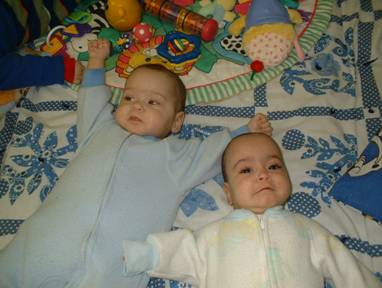
Maia
and Maestra, 8 months
(two girls of a set of triplets whose brother was kept by the
parents)
Several
of you have asked about the clinic and whether the children
are orphans or not. the Tutova Clinic is part of a hospital
and it is classified as a "failure to thrive" clinic taking
up to 38 children who are malnourished, suffer from fetal alcohol
syndrome or have other special needs including (at the present
time).
Alexandra
is two and suffers from dwarfism and brittle bone disease (i.e.
her bones break easily). Today we received a crib bumper from
a former volunteer because when she moves around and dangles
her legs between the crib rails and then turns over, it scares
everyone to death... and has caused breaks in the past, including
two arm breaks. She has hugely long eye lashes... she was abandoned
by her gypsy parents 18 months ago. They have never visited.
She is a doll and very small for her age... more like the 9-
month olds.
Constantin
is 18 months and has some type of neurological problems. He
is "in his own world" and rarely shows any expression. When
you approach him he lifts his arms very, very slowly and just
wants you to hug him. I have played with him for three or four
hours and he is very slow, but loveable. He sometimes bangs
his head against the crib.
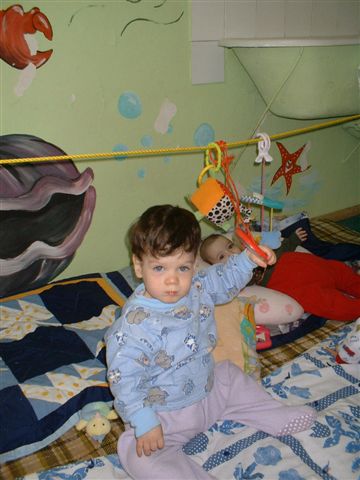
Lillianne
Lillianne
is almost two and never makes a sound. She moves her hand very,
very slowly in front of her face in a sort of "hi" or salute
when you walk in the room. She is very shy and it takes time
for her to warm to people. She came to me instantly which I
loved, of course. She picks at the plaster on the wall out of
boredom. Many of the children do... Head-banging is not uncommon.
That's the hardest for me.
Ianotz
(Ya-nootz which is Romanian for Johnny) is developmentally delayed
and spends much time kicking against the wall of the crib and
it sounds like numerous bass drums, much to everyone's dismay,
including his roommates.
Anna
Maria is 2 1/2 and suffers from such severe acid reflux
that she must have her hands bound in gloves or socks and wears
diapers around her neck like a shawl.
There
are many others.... but most of the children are "normal" --
but not when they first come in. For the most part their parents
either abandon them at the hospital or bring them in between
one and four months after birth when the children are failing
and the parents are overwhelmed (hence all the twins). About
20% are gypsy children. The parents never visit. Ramona from
Global Volunteers tells me that "one" set of parents came in
a few months ago 8 months after bringing twins Juan (John) and
Mihai (Michael). They didn't recognize them since they weighed
3 pounds when brought in and are simply huge now. They also
thought they were girls and insisted on looking at their "parts"
to be sure.
Vioral
and Marian were 3 pound twin boys at four months and they are
now 8 pounds. They were born at 2 pounds. Many of the children
are classified as malnourished and have anemia and often rickets.
When is the last time you heard of that (vitamin D deficiency)?
They are fed these super formulas and thrive.
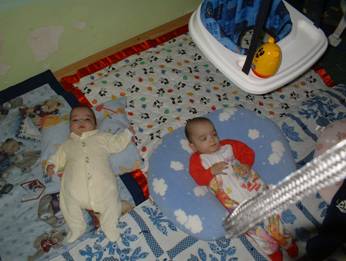
Vioral
and Marian, Twin Boys at 8 months
If
there are no volunteers to hold them, even the tiniest ones
feed themselves with a bottle propped up. Mihai, the 4-pound
new baby brought in last week is eating alone. His picture is
below. If
there are no volunteers, they stay in their crib all day unless
staff have a minute to pick them up – although they do get out
to the playrooms at least once a day when volunteers aren’t
there.
The
toddlers have an afternoon teacher who is fantastic!.... but
needless to say, they don't thrive much without all these folks
coming from America, Canada, Australia and the UK. It's overwhelming
at feeding time. I felt today like a mother dog with 12 puppies
and six places to feed from.
Having
said that, I am loving it. Usually the volunteer tour is two
to three weeks and the team tours on the weekend to Transylvania
and the mountains. I am not interested in traveling alone (with
a car and driver since they won't rent a car directly from Barlad)...
so I am working through the weekend through Friday the 17th
and then taking the evening train with Ramona back to Bucharest.
More about the kids later...
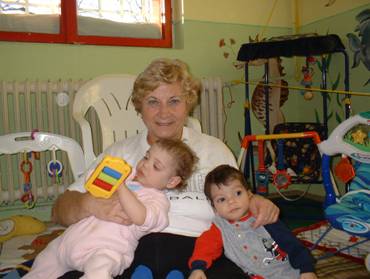
Gloria
with Florika and Daniel (each from a set of twins)
Here
are some things about Barlad, Romania you might find interesting:
(1)
I am desparately seeking fiber: there are no leafy vegetables
besides cabbage and I haven't seen anything green in ten days.
I left the fiber pills on my bathroom counter, so...
(2)
Hotel Toilet Paper is purple which is extremely distressing
when you turn to flush it.
(3)
Dinner at Ramona's parents' apartment was wonderful and interesting.
Her parents are a delight and once again I am reinforced that
most families in the world are alike: As I said in my first
email, lights in hallways and entrances is very dim or there
are no lights at all. This comes from both the tremendous expensive
of electricity and fuel -- and the trauma that people experienced
under communism when they had electricity only two hours a day.
When I think of all the track lights in my living room, I am
embarrassed by our excess.
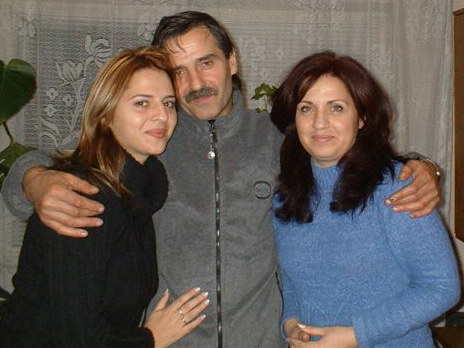
Ramona's
parents were delightful - and so attractive. They speak little
English and she translated. Doine, Ramona's Mom, is a great
cook and they were so gracious and generous. Dinner was pan-fried
meat, carrots and turnips. First course was shredded cabbage
with vinegar and some bologna and cheese. They served local
wine which is bottled in used plastic soda bottles... and Ramona
brought home milk in a large Pepsi bottle that one of the aides
and brought from the farm in the a.m. I couldn't have been more
welcome.. And I am invited back for a traditional Romanian meal
next week. I can't wait.
(4)
Horses and Carts are the primary way things are carried and
people move around in the countryside – but not in the towns..
At night time the carts are filled with workers... much like
the Tuk Tuks in Kathmandu. No motor bikes. My driver has a car
that is literally pieced together and has a stainless steel
"cover" over the keys. It looks like another century driving
the 16 km to the clinic in the a.m. This morning we came across
an accident where a mother of 9 children had been hit by a tractor
trailer. There are no sidewalks and those who do not have a
ride in a cart walk -- even in the dark. It is frankly terrorizing
to drive home in the dark.
(5)
Getting money is always interesting The Romanian Lei is 27,800
to the dollar and for the math-impaired, doing calculations
is complex. ATM lines are 30 people long on Friday night, pay
day. There are clearly very few here. Also, the money changers
won't take any of my American dollars that are bent or don't
look spanking new. I am in trouble. Tomorrow I will have to
wait in the ATM line. Maybe it will be shorter on Sat. night.
That's
it for tonight.... I miss everyone but am very happy. Reading
lots of books in the evening. Shopping for bottled water (there
is really absolutely nothing to buy here) and watching Animal
Planet and the Discovery Channel as much as I can stand. There
is no CNN... just Euro news and it's in French every other day.
Best,
Glo
|